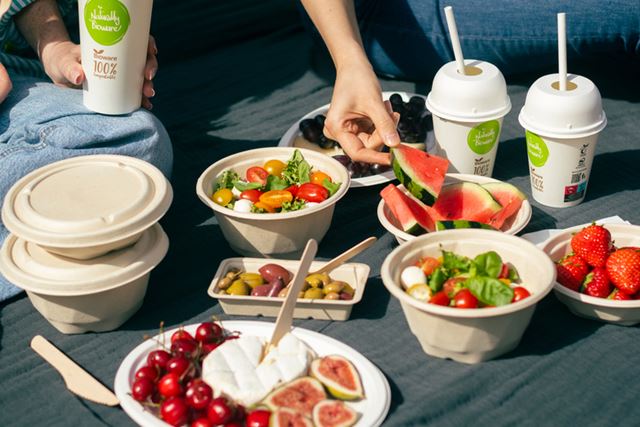
The food and everyday necessities packaging market is expected to grow around 30% by 2030. With only 30% of the packaging in the market currently meeting key standards for sustainability (we define sustainable as recyclable, compostable or reusable and made from responsibly sourced materials), this opens innovation opportunities for sustainable solutions in the packaging market.
The transformation of the packaging industry is accelerating, driven by demand for sustainable innovations that are fit for a competitive market. With our strong track record in innovating and launching sustainable solutions, coupled with an expected long-term trend of growing demand, Huhtamaki is strongly placed to meet customer needs and support their innovation and growth journeys by providing sustainable technology innovation at scale.
Keeping up with market shifts is crucial when making your business and sustainability decisions. Let’s have a look at the four trends that are shifting in the packaging market:
Consumers
We are nearing a significant transformation in consumer behavior, where brands that are being clear and demonstrate their sustainable credentials and pledges outshine those that offer insubstantial promises. This tipping point, where sustainability becomes a fundamental criterion for purchase decisions, is rapidly approaching. Around 64% of global consumers are concerned and conscientious around sustainability. In addition to price and quality, consumers continue to consider the environmental and social impact of products and their packaging. The growing awareness among consumers accelerates the agenda for sustainable, affordable, adaptable, and functional packaging.
Packaging value chain
The packaging value chain is cross-fertilizing across material suppliers, development of complex technologies and digital innovation to deliver new solutions on a global scale. Collaborating across the ecosystem to achieve systemic and scaled change is key for solving global challenges related to food waste and recycling. By accelerating the shift to sustainable packaging and rethinking packaging design to promote circularity, companies can achieve multiple benefits. These include reducing costs and environmental impact, avoiding the rising expenses associated with inaction, enhancing consumer engagement, and ensuring regulatory compliance. Also, transparency and accountability demand is rising due to increased scrutiny and greenwashing, and therefore employing verified product claims and packaging to convey sustainability is becoming crucial for companies to reinforce their sustainability commitments and comply with stricter regulations.
Customers
A changing consumer sentiment and shifts in regulation are driving the demand for circular solutions. Customers, such as brand-owners, turn to partners who can help them reach their commitments to reduce their carbon footprint by innovating and providing added value with solutions that can be scaled across their global operations. It is crucial to engage customers by offering tailored solutions to their specific needs. Major brands (such as Unilever) have ambitious climate goals, making the role of suppliers crucial in this effort. Brands are increasingly selecting suppliers who can contribute to meeting these targets. Since suppliers significantly influence their customers' Scope 3 emissions, their role is vital in the broader achievement of climate objectives.
Sustainability
The increasing urgency to address sustainability issues has started across industries, accelerated by regulation striving for a circular economy. This development is not only a moral requirement but creates new business opportunities for innovative solutions in the packaging industry. Younger generations are 27% more likely to purchase from brands that care about their products impact on people and the planet and sustainability is thus a powerful driver also in building trust in a brand or company. Sustainability for the future of our planet will be non-negotiable, requiring innovating with our customers and partners to create solutions for packaging circularity and plastic substitution.

